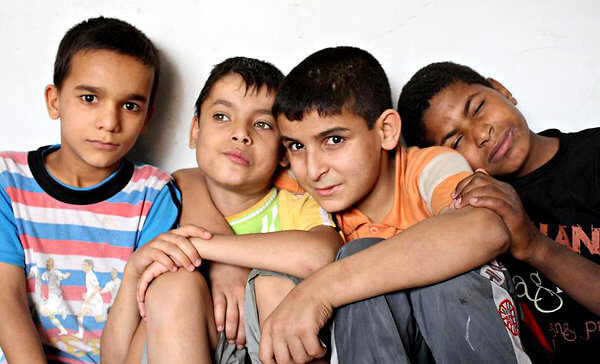
No one is spared in war.
Thirty-three years of political mistakes made in Iraq has today resulted in three million orphans.
Atia and Mohamed Al-Daradji’s haunting documentary,
I
n My Mother’s Arms
,
profiles Iraq’s orphan generation.
These orphans are children living in a broken nation, eternally haunted by the blasts that killed their parents and took away their futures. They, the orphans, are Iraq’s forgotten victims.
As rugged as the lives it records, In My Mother’s Arms documents a makeshift orphanage in ‘Sadr City’, a dangerous and impoverished neighbourhood in post-war Baghdad. Hisham Al-Thabe heads the two-bedroom orphanage, which houses 32 boys that have been traumatised by the violence of Operation Iraqi Freedom. The filmmakers record the day-to-day life of the orphanage, revealing the friendship between the children, their school-fights, their fleeting moments of happiness, and their attempts to deal with grief and displacement.
Viewers come to understand the psychology of both the orphan boys and their carers as they deal with an eviction notice from their landlord. To help them cope with the possibility of homelessness, the boys put on a performance called ‘In My Mother’s Arms’. The musical gives the boys a platform to reveal themselves and, in a country with many individual tragedies, be heard.
The documentary is perhaps most successful in highlighting the inadequacy of Iraq’s social welfare system, which, as recent reports have revealed, has less than 200 social workers and mental health professionals working to help its post-war, orphaned generation. The Al-Daradji brothers use video interviews with children who have been physically and sexually abused in state-run orphanages, footage of injured children in dilapidated state-run hospitals, and recordings of frustrating phone calls with the Department for Children to show how the Iraqi government has failed in orphan care and child protection. Hisham is able to provide his orphans a sense of normalcy purely through collecting donations from individuals.
Although In My Mother’s Arms is an informative tear-jerker, it constantly jumps from one orphan, carer, or government institution to the next. This choppy filming reduces from the documentary’s overall cohesion. It is no doubt important to make viewers aware of post-war Iraq’s societal issues, and give voice to the voiceless, but the filmmakers explore too many new angles, document the daily lives of too many people, and detail too many government failures within 86 minutes. Ultimately, some of the documentary’s overall power in informing and mobilising its viewers is lost.
In My Mothers Arms provides a heart-wrenching snapshot of a city that I once remember as home. Baghdad is now home to a struggling and broken people. The orphaned boys continuously sing throughout the documentary, “I’m too young for all this pain, I’m too young for all this agony”, forcing viewers to remember Iraq’s orphaned generation, a generation that Australia helped create.
In My Mother’s Arms is screening at the Arab Film Festival in Canberra, July 6, 2013 at 4.30 pm. Visit the website for more details.
